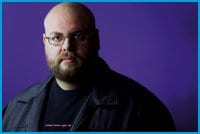If Malcolm Ingram justwanted to make a documentary about a gay bar, he could have chosen any of the dozen within a block of his apartment in Toronto’s Church-Wellesley gaybourhood. Instead he travelled to the US deep south to find the pioneering queer joints on the fringes of the Bible belt.
“I went on Gay.com to find out where people would go,” says Ingram, director of the feature-length Small Town Gay Bar. “I was talking in the Mississippi room and someone told me about [the bar] Rumours, which had no Internet presence at all. It’s in a town of about 1,500 people [named Shannon] right in the middle of Mississippi, and 10 miles away from the headquarters of the [conservative lobby group] American Family Association.”
Filmed over two years in Shannon and Meridian, Mississippi, Small Town Gay Bar chronicles the communities that have taken root in the tiny bars that service queers from across the state and neighbouring Alabama. Watching the film in Toronto is a bit like taking a trip back in time to when homosexuality was still taboo.
“One of the things that fascinated me with the topic was that these people who live in a community that’s not very tolerant put all their time into running a place and putting a flag out that alienates them from the rest of the community,” says Ingram. “They feel like there has to be a place to go. It’s not even really cruisy. It’s just a place to go and be with like people.”
Last year Small Town Gay Bar was nominated for the grand jury prize at Sundance. The film also attracted attention for having been produced by Kevin Smith (Chasing Amy) and for its Toronto-centric soundtrack featuring The Hidden Cameras and Broken Social Scene.
But amid the film’s celebratory tone looms the threat of violence. Good ol’ boys at other bars threaten any gay man who makes a move on them, and local snitches take down the licence plate numbers of cars parked outside the gay bars.
“I think they’re afraid of violence, but they have to live their lives and be themselves,” Ingram says. “They don’t live as outwardly out, they don’t walk around holding hands, and they think that’s just the way it is.
“Certainly a lot of the clichés are true. It is an intolerant place and there is racism. There are places that black people can’t go. When you’re raised in this soil, there are some things that you know you can’t do.”
It’s perhaps that danger that makes the communities in these towns so vibrant. In these bars, everyone knows everybody else, they share the same struggles. It’s this feeling of commonality that often gets lost in the larger cities.
“In an urban centre we bandy the word ‘community’ around so much, but we’ve got the twink bar, the dyke bar, the leather bar, etc,” says Ingram, who’s 30. “But in these small towns, there’s really only one place to go, and you get a real sense of community that you don’t experience in an urban setting.”
For most of us, it’s easy to assume that the city is the only option if you’re queer, and Ingram, who grew up in Oakville, felt the same way. “I came in with this hubris, asking ‘Why do you stay here?’ And they said, ‘Because this is my home,'” says Ingram. “There’s a myth that gay people are better off if they move to San Francisco or New York, [yet] these people want to be in their homes.”
Some of the traditions of big city queer culture just don’t translate to the rural south, as Ingram learned. “They really tried to organize the first Pride event while we were shooting, but a lot of people were like. ‘We don’t need that. We don’t need to march to feel proud.’ They felt that marching and having their own day alienated them from the community,” he says.
“People in the south, they just don’t want to inconvenience each other. It’s kind of rude to be that bold.”
Ingram suspects that these communities will eventually become part of the cultural landscape of the South, but that they’re never going to be as vocal as the communities of the big cities.
“They haven’t had their Stonewall,” he says. “I don’t think there’s going to be a definitive moment. It’s a longer process and more organic.”
Ingram is back in Mississippi, working on a screenplay for a dramatic film based on Small Town Gay Bar. He feels the media portrayal of queers, most of which comes from the big cities, isn’t helping queers in fringe communities. “Our media representation of gay culture, I find, is kind of a gay minstrel show. I look at Queer Eye For The Straight Guy and Jack from Will And Grace as no different from Amos ‘N’ Andy,” he says. “These people look at it and say, ‘Who sees themselves in Queer Eye?'”


 Why you can trust Xtra
Why you can trust Xtra


